In a significant step towards sustainable marine research and zero-emission ship design, Oceans North, in partnership with Miawpukek Horizon Maritime Services, Allswater, and MEOPAR, is thrilled to announce that it has received project funding from the Government of Canada to design a state-of-the-art, multi-use, zero-emission ocean research vessel.
This project will provide the conceptual design for a new Canadian ocean research vessel and assess the feasibility of zero-emission propulsion technologies, setting a new standard for deep ocean and remote area research in Canadian waters.
The design will consider the combination of zero-emission fuels with battery technologies that will allow the vessel to operate in “ultra-silent” mode, significantly reducing underwater noise when entering sensitive ocean ecosystems. In addition, the project will develop and utilize new versatile, modular research infrastructure that will allow the vessel to support a wide range of oceanographic and commercial activities, ensuring Canada can operate at the forefront of Arctic and marine research for the next 50 years.
The project received $125,000 under the Government of Canada’s Clean Vessel Demonstration grant stream of the Green Shipping Corridor Program.
The feasibility study will be led by Miawpukek Horizon Maritime Services, a majority Indigenous-owned marine services company based in Newfoundland and Labrador, in collaboration with Allswater, a leading Canadian ship design and naval architecture firm.
Additional project partners include Qikiqtaaluk Corporation, Freire Shipyard, MEOPAR, and the University of Alberta.
“We would like to thank the Government of Canada for recognizing this groundbreaking project. This funding will allow us to assess emerging zero-emission technologies that will play an essential role in reducing marine emissions and positioning our business for the future,” says Richard MacLellan, Managing Director of Miawpukek Horizon Maritime Services.
“The new vessel will not only enhance Canada’s research capacity, but also set a new standard for sustainable ocean-based research. We are proud to lead this initiative with our partners.”
Allswater will provide the critical naval architecture and engineering expertise for the design of the vessel.
“Designing a zero-emission research vessel is an exciting challenge that aligns with our commitment to innovation and sustainability,” says Rob Crutcher, Senior Naval Architect at Allswater. “With over two decades of experience, this project will leverage cutting-edge technologies and collaborative efforts to deliver a vessel that meets the rigorous demands of Arctic and remote area operations while minimizing environmental impact.”
Oceans North will support the project by providing strategic oversight and ensuring alignment with Canadian environmental and climate goals.
“This project exemplifies the kind of collaborative effort needed to address the urgent challenges of climate change. By developing a zero-emission research vessel, we are not only creating greater opportunities to advance marine science but also demonstrating that Canada can be a leader when it comes to advancing emission-free technologies that are needed to mitigate climate change and protect our oceans,” says Brent Dancey, Director of Marine Climate Action at Oceans North.
Doug Wallace, Associate Scientific Director of MEOPAR and co-Chair of its National Research Vessel Task Team, highlighted the critical importance of a zero-emission vessel for Canada’s research agenda.
“This vessel will fill a major gap in Canada’s research capabilities. With the massive changes taking place in our oceans due to climate change, and increasingly diverse use of our oceans, it is more important than ever to have a large research vessel where Canadian scientists can collaborate across all types of research,” he says.
The project team will assess the feasibility of building a zero-emissions research vessel, identify suitable technologies and fuels, and develop a comprehensive blueprint and business case for future zero-emission vessel projects. The project also aims to successfully demonstrate the benefits of developing made-in-Canada zero-emission vessel expertise while supporting the wider adoption of zero-emission marine technologies. The project team is committed to sharing its findings to advance new technologies across the marine economy.
The project is set to begin immediately, with key milestones including research and development of alternative fuel sources, vessel concept design, engagement with industry and Canada’s research community, and completion of performance specifications. It is expected to achieve significant progress over the next year, laying the groundwork for the vessel’s construction and deployment.












